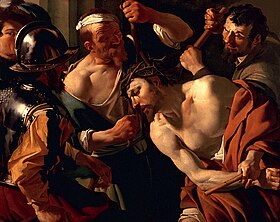
Back يسوع ملك اليهود INRI ARZ INRI BCL INRI Byelorussian INRI Bulgarian INRI Breton INRI Catalan INRI Czech INRI Danish INRI German INRI Esperanto

In the New Testament, Jesus is referred to as the King of the Jews, both at the beginning of his life and at the end. In the Koine Hellenic of the New Testament, e.g., in John 19:3, this is written as Basileus ton Ioudaion (βασιλεὺς τῶν Ἰουδαίων).[1]
Both uses of the title lead to dramatic results in the New Testament accounts. In the account of the nativity of Jesus in the Gospel of Matthew, the Biblical Magi who come from the east call Jesus the "King of the Jews", causing Herod the Great to order the Massacre of the Innocents. Towards the end of the accounts of all four canonical Gospels, in the narrative of the Passion of Jesus, the title "King of the Jews" leads to charges against Jesus that result in his crucifixion.[2][3]
The initialism INRI (Latin: Iesus Nazarenus, Rex Iudaeorum) represents the Latin inscription (in John 19:19 and Matthew 27:37), which in English translates to "Jesus the Nazarene, King of the Jews", and John 19:20 states that this was written in three languages—Jewish tongue,[a] Latin, and Hellenic (ΙΝΒΙ = Ιησούς Ναζωραίος Βασιλεύς Ιουδαίων)—during the crucifixion of Jesus.
The title "King of the Jews" is only used in the New Testament by gentiles, namely by the Magi, Pontius Pilate, and the Roman soldiers. In contrast, the Jews in the New Testament use the title "King of Israel"[7][2] or the Hebrew word Messiah, which can also mean king.
Although the phrase "King of the Jews" is used in most English translations,[b] it has also been translated "King of the Judeans" (see Ioudaioi).[8]
- ^ Boxall 2007, p. 125.
- ^ a b France 2007, p. 1048.
- ^ Hengel 2004, p. 46.
- ^ a b Buth & Pierce 2014, pp. 107–109.
- ^ Köstenberger 2009, p. 350.
- ^ Breuer 2006, pp. 457–458.
- ^ Strecker & Horn 2000, p. 375–376.
- ^ Robbins 1996, pp. 76–77.
Cite error: There are <ref group=lower-alpha> tags or {{efn}} templates on this page, but the references will not show without a {{reflist|group=lower-alpha}} template or {{notelist}} template (see the help page).